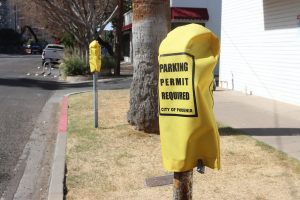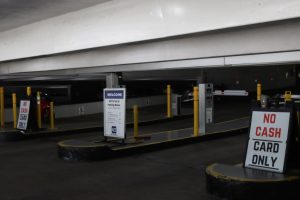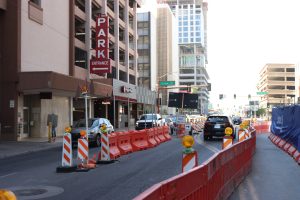- Slug: BC-CNS-Downtown Parking Woes. About 825 words.
- Photos available (thumbnails and captions below).
By Jacob Snelgrove
Cronkite News
PHOENIX – The downtown area has seen significant growth over the last several years, and the influx of people has increased the parking demand.
R.J. Price, chief growth officer at Downtown Phoenix Inc., said the downtown population has tripled since 2000, but that the best indicator for the health of downtown Phoenix are its sidewalks, which have never been more energized, vibrant and full than in 2023.
“We were never expected to be a place that people were going to do vertical living and live in the middle of downtown,” Price said. Fast forward to 2023, and more than 12,000 residential units have been built, with 4,000 more under construction.
Due to the population growth and ongoing construction of new housing and other projects, parking is a common complaint.
“I moved in at Kenect Phoenix, and the parking garage fee is out of my price range,” said Chanon Wang, an Arizona State University senior and downtown Phoenix resident who has lived at his apartment at Polk Street and Central Avenue for six months. “Most of the time I park at one of the meters nearby. They’re cheap.”
Kenect Phoenix offers all-access day parking passes for $40.
As of 2022, downtown Phoenix had 60,254 parking spaces, including lots, garages, meters and curb parking, according to a city of Phoenix study.
Parking garages and lots
The majority of parking downtown is in garages – more than 38,000 spaces, according to the city’s study.
ACE manages 23 garages downtown and at Phoenix Sky Harbor International Airport, according to Bill Kepp, executive vice president of ACE Parking. The company also manages some surface lots.
“We have seen incremental increases to both transient and monthly rates at most of our facilities in the past two years,” Kepp said. “Parking facilities are a part of the same economy as all other services, and we have seen increases in prices that reflect the overall rising costs of all goods and services.”
The city’s comprehensive parking study done last year evaluated the supply and demand of the existing parking inventory in the downtown area. According to the study, garage parking makes up approximately 65% of all parking in downtown Phoenix.
The study included the area roughly from Buckeye Road to just north of McDowell Road and Seventh Avenue to Seventh Street.
Special events are a huge part of the downtown Phoenix economy, from First Friday to Phoenix Suns and Mercury games to events at the Phoenix Convention Center to the recent Arizona Diamondbacks World Series games.
“Whenever there is an event where attendees are expected to exit all at once, we charge an event rate upon entry to make egress easier on parkers,” Kepp said, noting parking prices vary at each ACE location.
Many people attending these events have to deal with extensive traffic and road closures and have to pay higher prices to park in private or city-owned garages or lots.
City-owned off-street parking is generally $15 daily and $60 to $75 monthly, depending on the facility.
On-street parking is limited in downtown Phoenix due to ongoing construction in the area.
Kepp said construction lane closures cause delays for people looking for parking. “ACE works with the city of Phoenix to advocate for our facilities and limit lane restrictions to times when our garages have minimal demand.”
Phoenix’s Street Transportation Department’s Right-of-Way Management Office coordinates traffic control for temporary street closures and restrictions related to construction and maintenance projects, plus special events and block parties.
Visitors have to weigh a number of factors when choosing where to travel and park. These include cost, convenience and proximity to their destination.
Parking meters
The Street Transportation Department operates approximately 2,000 parking meters in the downtown, uptown, Capitol and Phoenix College areas and is “continually considering changes and improvements to transportation infrastructure to ensure efficient and safe travel for all users of city roadways, including drivers, bicyclists and pedestrians,” said Gregg Bach, spokesperson for the department.
All parking meters are enforced daily between 8 a.m. and 10 p.m. Many meters cost $1.50 per hour, and some cost $1 per hour. Time limits at metered locations can range from 15 minutes to as long as eight hours. In most areas, the maximum duration is two hours.
“Parking meters are placed in areas where parking turnover is desired to support activity related to retail, commercial and dining destinations,” Bach said. “The two-hour time limit is appropriate for visitors participating in those activities.”
On-street metered parking is free overnight from 10 p.m. to 8 a.m.
The department maintains and collects coins from the meters, though many can be paid by debit or credit card or a parking mobile app. The Phoenix Police Department manages parking and expired meter enforcement.
According to the city of Phoenix study, parking issues are too complex and widespread for status quo approaches to management. The city needs to provide more focused, coordinated, and strategic attention to daily management and delivery of near- and long-term parking solutions.


